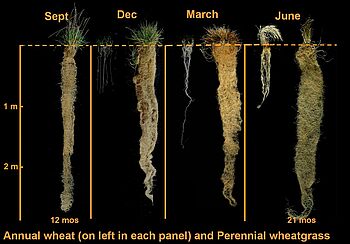Inhalt: Project details
Duration
09.2022 - 08.2025
Contact person
Dr. Torsten Thünen (PB)
Tel: +49 (0)531 596 2317
torsten.thuenen@julius-kuehn.de
Inhalt: Evaluation of the potential of perennial cereal cultivation for carbon storage (KlimaGetreide)
Background:
Perennial crops have positive characteristics compared to annual crops. These include reduced need for tillage, increased evaporation and reduced erosion, deeper and more permanent rooting, and higher utilisation of the annual photosynthetically active radiation. They have the potential for increased carbon storage, increased soil fertility, improved nitrogen utilisation as well as reduced nitrate leaching and more efficient use of soil water resulting in higher biomass formation.
Objectives:
The aim of the project "KlimaGetreide" is to assess the climate change mitigation potential of perennial cereal cropping systems in comparison to annual cultivation systems. In addition to yield and quality determinations, the carbon storage potential will be investigated. With a view/In relation to the improvements in nitrogen efficiency that will be necessary/are required in the future, especially in cereal cultivation, the impact of perennial cultivation compared to classically close cereal crop rotations on nitrogen dynamics and nitrate leaching will be considered.
However, perennial crops may also have potential disadvantages compared to annual cropping systems. For example, pathogen numbers may build up over the years at a given site and could thus limit the yield potential. Basic surveys are also being carried out on this.
The soil microbiome is essential for // contributes essentially to soil fertility and thus also to carbon storage. Here comparative studies are being carried out between the two cultivation systems. In addition, synergistic effects of mixed cultivation with legumes will be investigated. These include the nitrogen supply of both partners, phytosanitary aspects, entomological biodiversity, flowering availability for pollinators and the effects on pathogens.

